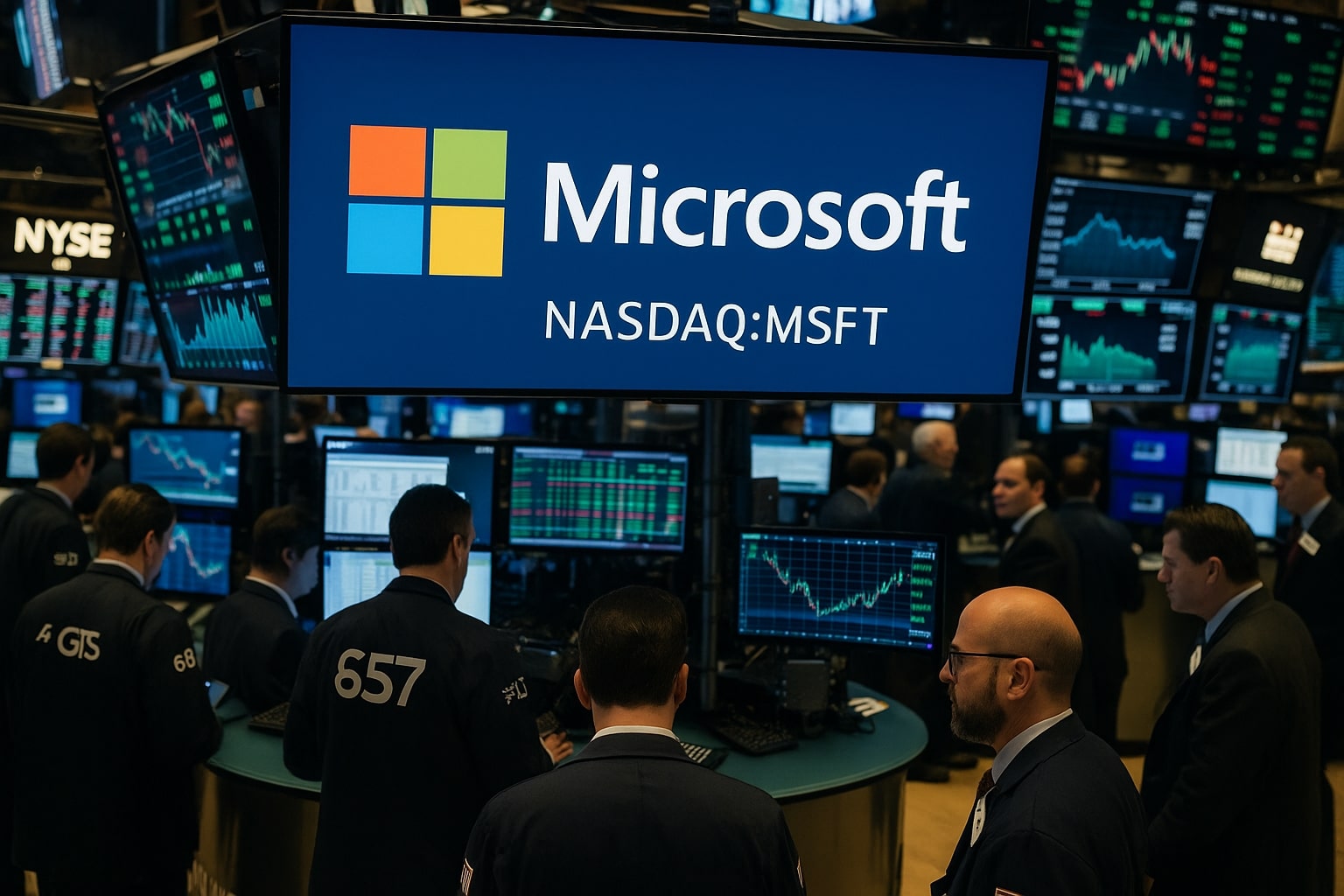
Microsoft (NASDAQ:MSFT): A Must-Have Stock in 2025 for Growth and Innovation
Given Microsoft’s recent 4.13% YTD gain and dominance in the cloud space, is it a wise move for investors to buy MSFT at its current price of $441? How do its strong earnings, innovative advancements, and market leadership impact the stock’s potential? | That's TradingNEWS
Microsoft (NASDAQ:MSFT): A Buy for Growth and Innovation
Microsoft's Resilient Performance Amidst a Challenging Market
In 2025, Microsoft (NASDAQ:MSFT) has been one of the few stocks to demonstrate significant resilience, outperforming the broader market despite ongoing volatility. The S&P 500 has struggled with a 3.59% year-to-date (YTD) decline, and the NASDAQ has fallen 7.19%, but Microsoft’s stock has posted a 4.13% YTD gain. This outstanding performance can be attributed to the company’s strategic investments in cloud computing, artificial intelligence (AI), and its Azure platform, which continues to gain market share in the highly competitive cloud industry. Even in a market environment where many technology giants, often referred to as the "Mag 7," have struggled, Microsoft’s ability to maintain positive growth trends places it among the top performers in the sector.
Strong Financial Growth and Robust Earnings
The company’s Q3 2025 results highlighted its solid growth trajectory, showing revenue of $70.07 billion, a 13.3% increase compared to the same period last year. The revenue growth was driven by consistent performance across all three business segments: Intelligent Cloud, Productivity and Business Processes, and More Personal Computing. These segments contributed to a diversified revenue stream that continues to strengthen Microsoft’s financial foundation.
Intelligent Cloud: The Heart of Microsoft’s Growth
The Intelligent Cloud segment, which includes Azure and other cloud services, remains the key driver behind Microsoft's growth. For Q3 2025, this segment generated $26.75 billion, marking a 20.8% YoY increase. Within this segment, Azure, which continues to dominate the cloud industry, reported a 33% growth in revenue, further solidifying Microsoft’s position as a leader in cloud computing. As AI services and data center infrastructure become integral to businesses, Microsoft’s cloud offerings are poised for continued expansion. The company is also doubling down on its capital expenditures, with $80 billion allocated for infrastructure development, mostly focused on AI-driven cloud services.
The global market for generative AI is expected to grow from $45 billion to $1.1 trillion by 2028, and Microsoft is investing heavily to capture this potential growth. Their strategic investments in AI infrastructure and the development of new data centers are expected to provide a long-term competitive edge. Microsoft's partnership with OpenAI is an example of how the company is positioning itself for future AI dominance, allowing it to integrate AI capabilities into its cloud platform and enhance services such as Azure AI and Microsoft 365.
Productivity and Business Processes: Consistent Growth
Another major segment driving Microsoft’s strong earnings is its Productivity and Business Processes division, which includes products like Microsoft 365, LinkedIn, and Dynamics. This segment saw a 10.4% growth, generating $29.94 billion in revenue. The Microsoft 365 suite continues to be a crucial component of the business, with commercial product sales increasing by 11%, primarily driven by cloud-based services. Meanwhile, LinkedIn, which operates as both a professional networking platform and a significant source of advertising revenue, reported a 7% revenue growth. Dynamics, another key product in the productivity suite, grew by 11%. The steady growth across these areas highlights the company’s ability to expand its offerings beyond the cloud.
More Personal Computing: Strong Performance in Gaming and Search Advertising
The More Personal Computing segment, though smaller compared to the cloud and productivity divisions, continues to perform well. This segment, which includes Windows, Xbox, search and news advertising, and device sales, generated $13.37 billion, reflecting a 6.1% YoY growth. Although Xbox hardware sales decreased by 6%, the gaming division was bolstered by a 5% growth in content and services, driven by services like Xbox Game Pass and the popularity of titles such as Call of Duty and Minecraft.
The search and news advertising aspect of the business also performed admirably, with a 15% increase in revenue, adding $449 million to Microsoft’s total revenue. This demonstrates the company’s ability to leverage its search platform to generate consistent advertising revenue, even as the broader tech sector faces economic headwinds.
Microsoft’s Cash Flow and Shareholder Returns
Microsoft continues to generate strong cash flow, supported by its net cash position of $36.74 billion. In Q3 2025, the company returned $6.17 billion to shareholders through dividends and $4.24 billion through share buybacks. These efforts underscore Microsoft’s commitment to enhancing shareholder value while maintaining a strong balance sheet. The company’s dividend payments and share repurchase program also reflect confidence in its ongoing growth and financial strength.
The company is in a strong financial position to continue rewarding investors, with a healthy operating cash flow of $37.04 billion in Q3 2025, a substantial increase from the previous year’s $31.92 billion. These numbers reflect the company's ability to sustain its operations, fund innovation, and distribute returns to shareholders.
Valuation and Investment Potential
Despite Microsoft's impressive growth, its valuation remains a point of discussion. The P/S ratio has increased to 12.08, reflecting a premium relative to the sector’s median of 2.84. While Microsoft’s valuation might seem high compared to the broader market, the company’s strong growth trajectory in cloud services, AI, and quantum computing justifies this premium. The P/E ratio of 31.8 is also on the higher end, but given the company’s growth, particularly in the cloud and AI sectors, it is a reasonable multiple for long-term investors.
Comparing Microsoft to its peers in the tech sector, it remains competitively priced. While Oracle (P/E: 35.4) and Palo Alto Networks (P/E: 105.7) trade at higher multiples, Microsoft’s P/E ratio and P/S ratio are more reasonable given its strong growth potential. Moreover, its focus on AI and cloud infrastructure gives it a unique competitive advantage, further justifying the stock's premium valuation.
Future Outlook: Strong Guidance and Market Leadership
For Q4 2025, Microsoft has provided strong guidance, with projected revenue growth of 13.9%, led by continued strength in its Azure and cloud services businesses. The company’s guidance range of $73.15 billion to $74.25 billion reflects a continued robust demand for cloud infrastructure and AI services, which will likely drive further growth in the coming quarters. Additionally, Azure’s continued dominance in the cloud space is expected to fuel Microsoft’s market leadership for years to come.
Microsoft’s focus on quantum computing also positions the company for long-term growth. The announcement of the world’s first quantum processor powered by topological qubits could revolutionize the computing industry, unlocking new opportunities in AI, big data, and other sectors. The quantum technology market is expected to reach $173 billion by 2040, providing Microsoft with significant upside potential in the future.
Is Microsoft (NASDAQ:MSFT) a Buy, Sell, or Hold?
Considering Microsoft's strong financials, market leadership, and growth prospects, MSFT remains a buy. The company’s continued innovation in cloud computing, AI, and quantum computing, coupled with its strong cash flow, robust balance sheet, and ability to return value to shareholders, make it an attractive long-term investment. While its premium valuation is a factor to consider, Microsoft's ability to maintain a leading position in key growth sectors justifies its price.
In conclusion, Microsoft’s position as a leader in cloud computing and AI makes it a top-tier investment. The company's strong earnings performance, growth guidance, and continued investments in cutting-edge technologies provide solid support for its future growth. Therefore, for investors looking to capitalize on the future of cloud computing and artificial intelligence, Microsoft (NASDAQ:MSFT) remains an attractive buy at its current valuation.
For real-time updates on Microsoft (NASDAQ:MSFT), visit their stock profile here. You can also check insider transactions and other stock details here.
That's TradingNEWS
Read More
-
BITQ ETF Soars 66.55% as Bitcoin Blasts Past $124,000 — Crypto Equities Lead 2025 Rally
13.10.2025 · TradingNEWS ArchiveStocks
-
XRP ETFs XRPR, XRPI Slip as Ripple XRP-USD Holds $2.62 — SEC Fast-Track Could Ignite $20B
13.10.2025 · TradingNEWS ArchiveCrypto
-
Natural Gas Price Forecast - NG=F Steadies at $3.00 as U.S. Export Boom Tests Old Fields
13.10.2025 · TradingNEWS ArchiveCommodities
-
USD/JPY Price Forecast - Dollar to Yen Climbs to ¥152.28 as Japan’s Political Shakeup
13.10.2025 · TradingNEWS ArchiveForex


















